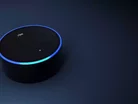Amazon secures a patent to further utilise Alexa to support patients

Amazon’s decision to acquire pharmaceutical start-up PillPack came as no surprise to many, but dramatically led pharmaceutical companies to plunge in the stock market in **. Known to transform traditional industries, healthcare will be Amazon’s next big challenge, yet the company will face a multitude of complex hurdles.
From data sharing, fragmented and/or outdated technologies, alongside country-specific regulations, the industry is slowly being reshaped to become more patient centric, where technology could work to reduce escalating healthcare costs and various barriers in communication.
The company’s new patent will work to support patients, where voice assistant. Alexa, will gain the ability to detect the health of a user and signs of illness. It will then be able to offer to help by purchasing medicine on their behalf.
See also
- Accenture and Merck partner with Amazon Web Services to launch a new platform to promote innovation
- Amazon hires a new cardiologist to its healthcare division
- Amazon sends further shockwaves by reportedly developing its own health clinics
The patent, "Voice-based determination of physical and emotional characteristics of users" describes that a device similar to Amazon Echo would listen not solely for the words used, but the tone of voice of the user, which can indicate symptoms of fatigue, stress and symptoms of an illness such as a cold. This would enable the technology to offer support by purchasing medicines if approved by the user.
"A current physical and/or emotional condition of the user may facilitate the ability to provide highly targeted audio content, such as audio advertisements or promotions, to the user," the patent says. "In FIG. 1, the voice interaction device 110 may optionally determine a follow-up inquiry of 'would you like a recipe for chicken soup?' in response to the user's utterance regarding hunger."
Further down, after the user declines, Alexa asks "By the way, would you like to order cough drops with one-hour delivery?"
Additionally, adverts could be tailored to the user’s current mood. For example, sore throat products for those who have a cough or cold, or will suggest things to do if the technology detects certain emotions, such as boredom.



